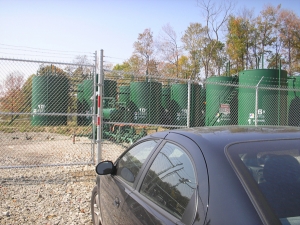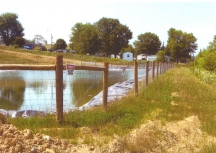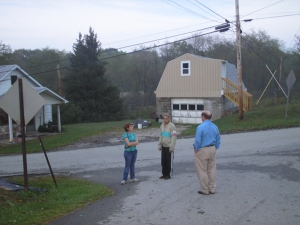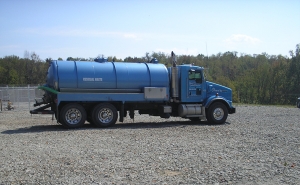Marcellus Rush – Hydraulic Fracturing
Marcellus Rush: Fractured State, Fractured Lives, Fractured Environment
Article One, section 27 of the Pennsylvania Constitution indicates that: “The people have a right to clean air, pure water, and to the preservation of the natural, scenic, historic, and esthetic values of the environment. Pennsylvania’s public and natural resources are the common property of all the people, including generations yet to come.” In light of this article and section, would you connect the rolling hills of Western PA with words like fracking pits, drilling rigs, contaminated water, compression stations, benzene, toluene, and disenfranchised citizens?
4/22/14: The Sisters of St. Francis of Philadelphia and 24 other members of ICCR and IEHN have filed a shareholder proposal on “Quantitative Water and Community Risk Management Reporting for Hydraulic Fracturing,” with Chevron. We are requesting quantitative and qualitative data on the impacts of hydraulic fracturing.
Attached here is an exempt solicitation that details the basis for our proposal. Special thanks for considering a “YES” vote in favor of protecting water, communities, and basic human rights.
I am a Sister of St. Francis of Philadelphia and an active member of the Interfaith Center on Corporate Responsibility (ICCR) and the Investor Environmental Health Network (IEHN). I never would have dreamed that the first day of Autumn 2010 would find me in a situation that witnessed to profound violations of the rights of our brothers and sisters in Washington and Greene counties. From Pittsburgh, Pennsylvania to Morgantown, West Virginia, we met with individuals and groups whose experience of hydraulic fracturing over the past few years was both disheartening and clearly a violation of human and other rights. These individuals and groups begged us to inform others that their air and water were contaminated, any hope for healthy living jeopardized, and any legacy left for their children and grandchildren might be devastating

We are reminded once again that our world and our state is fractured; there are gross inequalities, massive injustices, and a serious lack of accountability from our government and oil and gas companies. Throughout the region, one could not miss the evidence of hydraulic fracturing. Often the sight of a big rig was partially hidden from view by thick forests. The panoramic beauty of the hillsides, fields, and valleys of Autumn was fractured with long gravel, dusty roads; oil rigs; ugly “green tanks”; and the installation of massive pipelines. We traveled through back country, and in neighborhood after neighborhood, the pain and anguish of citizens was palpable. In one very rural area of Cross Creek, residents were split in their view of the oil well that owned the top of the hill. Some residents were kept to secrecy when their water supply became contaminated and they accepted “water buffaloes” from the gas company promising not to file a law suit. Others watched their pets become ill and instinctively refuse to drink the water. I noticed that the evening air was very heavy and foul smelling at times and I became aware of the frightening hiss of “off gassing” from a compression station. Residents told us that they cannot take showers or drink the water because of the chemicals that have contaminated it. From a physician report, one resident received verification that her blood sample contained methane and other chemicals. Because several of these families are experiencing the effects of hydraulic fracturing, concerned citizens from Pittsburgh are bringing water supplies to them.
In driving through the rural community of Hickory, I couldn’t help but notice the changing landscape, one still dominated by farmlands and woods, but dotted with evidence of Marcellus Shale exploitation. We drove through backwoods and a gravel road to meet with the owner of a farm that now has two active wells and a very contaminated pond and stream. The large pond supplying millions of gallons of water for fracking was a gas company’s dream. This farmer leased his farm in 2002, not realizing what the implications might be, and has since had to move out of his house due to lack of potable water and foul smelling air. He wanted us to know that “not only did the gas company destroy my property but they tried to get me to exchange it for another farm 11 miles away that they had already contaminated.” He told stories of farm bureau workers gathering leases, bundling properties and selling them to the gas companies. He reminded us that his story is a textbook case of what not to do in relation to the gas industry. We also learned that a regional school in this community will have fracking wells in close proximity to the school. When I asked where the School Board was, the answer was “they are bought out.” I asked about the PTO and the answer was similar. Many of the families had already leased their land to the gas companies.
We concluded our Washington County area tour with a visit to a very rich landowner who built a family dream mansion on top of a hill. Not realizing he didn’t own the mineral rights, he is now the devastated resident of a mansion surrounded by four gas wells on his property. He told us that one million gallons of fracking fluid was spilled on the side of the hill and all the water in the area is now contaminated. Since he is in the midst of a lawsuit, he does not accept water supplied by the company, but has to buy 25, 000 gallons of water almost every week. While still on his property, he took us on a very rough gravel road to the sight of one of the active oil wells and several condensate tanks. (For the record, the gas company required us to go through security by providing a passport or business card, even though we were accompanied by the landowner.) We learned more clearly that when natural gas is released from a well after the fracking process it goes through an inlet separator to remove fracking fluid, water, hydrocarbons, brine, and other possible radioactive minerals and chemicals. The naturally occurring VOC (volatile organic emissions) from these condensate tanks can be very hazardous and include such chemicals as benzene, toluene, ethyl benzene, exlene, nitrogen oxide, carbon monoxide and many other chemicals and contaminants. This family with three small children has been exposed to these emissions, explosions, venting, flaring and the constant fear of leakage and spillage.

The beauty that once existed in western Pennsylvania . . .

. . . now is littered with signs of hydraulic fracturing. Much like this waste-water pit only steps away from where children play.

The final stage of our tour took us to Waynesburg by way of many country towns and amazingly beautiful rolling hills and valleys being tainted by the installation of major gas pipelines. In the small town of Carmichael, PA, we actually stood by a fracking pit right next door to a residential trailer park. The drilling was complete but the pit remained while children played within a few hundred yards. In Waynesburg we met with several residents of the outlying community. Each one had a story to tell very similar to earlier accounts. Some were very angry that their elected officials didn’t defend their constituencies: but allowed the gas industry to dictate the rules. They fear that the DEP is rubber-stamping permits and that regulatory agencies are unprepared to address many problems including forced pooling. They shared photos of contaminated streams, fracking pits, a truck driver dumping fracking fluid, and pictures of an oil well on a known archeological site.
Needless to say, our journey into the Marcellus Shale country of two counties has us asking many questions and challenging us to use our voices to speak for those whose rights have been violated in over 30 counties. Since there is no moratorium on drilling, we hope it’s not too late to educate residents on their rights and the risks that go along with exposure to toxic chemicals. We cannot continue to pump carcinogens into the bedrock of our state, fill our air with heat-trapping gases and expect that we’re heading for a carbon free footprint. Why isn’t the Precautionary Principle being invoked?
As natural gas extraction companies continue to drill, drill, drill, our state needs a comprehensive policy for all aspects of gas exploration and use. This includes independent monitoring and a severance tax. The health of our citizens and the integrity and the beauty of our state are on the line and require serious action by all branches of government who represent citizens and not gas companies. We commend John Hanger, of the DEP for his most recent action in favor of the citizens of Dimock requiring Cabot Oil to foot the bill for pipelines for drinking water. We believe that speaking the truth to legislators and corporate executives is incumbent on all of us. After all, the Keystone State must continue to sound the bells of independence, freedom, justice, and the common good even more loudly than they did in 1776.
– Nora M. Nash, OSF

For more information and to take action steps use the following resources:
http://www.pennfuture.org/campaigns_detail.aspx?CampaignID=46







